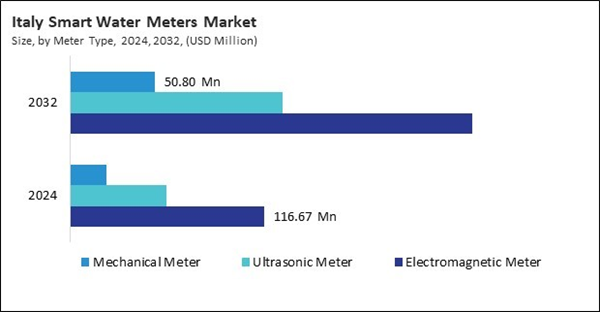The Germany market dominated the Europe Smart Water Meters Market by country in 2024, and is expected to continue to be a dominant market till 2032; thereby, achieving a market value of $817.2 million by 2032. The UK market is exhibiting a CAGR of 8.4% during 2025-2032. Additionally, the France market is expected to experience a CAGR of 10.6% during 2025-2032.
Smart water meters are being deployed across a spectrum of applications, each reflecting unique operational requirements and benefits. At the heart of their value proposition is the capability to provide utilities with granular, real-time data on water usage at the household, commercial, and industrial levels. This high-resolution data stream enables more accurate billing, eliminating the inefficiencies and disputes associated with manual meter readings and estimated consumption. In residential applications, smart water meters empower homeowners to monitor their usage patterns through user-friendly dashboards and mobile apps, promoting water conservation by making consumption more transparent and actionable.
Moreover, for commercial and industrial users, these meters offer insights that can inform process optimization, identify abnormal usage patterns, and support sustainability initiatives. Utilities leverage smart meters to detect leaks, unauthorized usage, and backflows, allowing for rapid response to issues that would otherwise result in water loss and infrastructure damage. Municipalities integrate smart meters into broader smart city initiatives, enabling holistic urban resource management and aligning with goals for energy efficiency, climate resilience, and public health.
Spain’s smart water meters market is growing rapidly, driven by severe water scarcity and EU-driven sustainability goals. As one of Europe’s most water-stressed countries, Spain relies on smart water meters to optimize distribution and reduce non-revenue water, particularly in regions like Andalusia. These devices, integrated with IoT, enable utilities to monitor usage and detect leaks, supporting Spain’s compliance with the EU Water Framework Directive and its focus on smart city development in cities like Madrid.
Russia’s smart water meters market is emerging, driven by the need to modernize aging water infrastructure and address inefficiencies in vast urban centers like Moscow. As the largest country in Europe by land area, Russia faces unique challenges in water distribution, with significant non-revenue water losses due to outdated systems. Smart water meters, equipped with remote monitoring, are gaining traction to improve efficiency and reduce losses, aligning with Russia’s efforts to upgrade utilities and meet urban water demands.
List of Key Companies Profiled
- Itron, Inc.
- Neptune Technology Group Inc. (Roper Technologies, Inc.)
- Honeywell International Inc.
- Badger Meter, Inc.
- Landis+Gyr Group AG
- Hubbell Incorporated
- Arad Group
- Diehl Stiftung & Co. KG
- B METERS S.R.L.
- Xylem, Inc. (Sensus)
Market Report Segmentation
By Technology
- AMR
- AMI
By Meter Type
- Electromagnetic Meter
- Ultrasonic Meter
- Mechanical Meter
By Application
- Residential
- Commercial
- Industrial
By Country
- Germany
- UK
- France
- Russia
- Spain
- Italy
- Rest of Europe
Table of Contents
Companies Mentioned
- Itron, Inc.
- Neptune Technology Group Inc. (Roper Technologies, Inc.)
- Honeywell International Inc.
- Badger Meter, Inc.
- Landis+Gyr Group AG
- Hubbell Incorporated
- Arad Group
- Diehl Stiftung & Co. KG
- B METERS S.R.L.
- Xylem, Inc. (Sensus)









